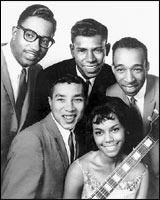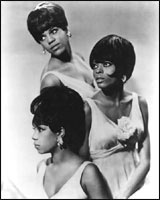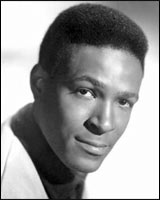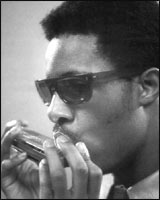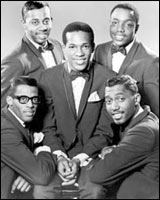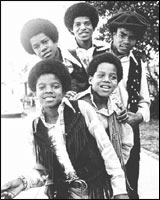|
Music Reviews
Alternative
Blues
Books
Christmas
Classic Rock
Country
Jazz
Lounge
Oldies
Power Pop
Punk & New Wave
Reggae
Rhythm & Blues
Seventies
Texas
Special Features
Randy's Rodeo
Sex Pistols
Motown
Halloween
Valentine's Day
Information
About Me
Feedback
Links
User's Guide
Support Me
Amazon
iTunes
Sheet Music Plus
|
Support Randy's Rodeo!  Shop at Amazon, iTunes, and more...
Shop at Amazon, iTunes, and more...
Motown's Artists. Any discussion of the artists of Motown
Records begins with a caveat: Motown was a sound. It was the driving beat, the propulsive
bass, the crackling cymbals, the punchy horns - and yet it was more. It was pop and
rock, black and white, soul, gospel, and glitz. It was all of the above, and it was
more than the sum of its parts. It was a sound that exploded from little speakers
in car dashboards and transistor radios, heavy with hopes and dreams, laden with
lust and anticipation, slicing like lightning through the smoggy heat of blighted
urban landscapes. From Detroit to Dallas, New York to Los Angeles, Motown was the
sound of the 60's - as much or more than the Beatles or Stones, Janis or Jimi, Stax
or Atlantic. Motown was a sound. It was "The Sound of Young America."
Even more, Motown was a sound created not by stars, but by committee. In a neat
row of houses on West Grand Boulevard, a handful of producers, songwriters, and musicians
created nearly every one of Motown's hundreds of hit singles. Like the shiny Cadillacs
that rolled off the assembly lines just down the road, these records were pieced
together with precision by journeymen like James Jamerson, Mickey Stevenson, Benny
Benjamin, Earl Van Dyke, Norman Whitfield, Nikolas Ashford, and the fabled troika
of Eddie Holland, Lamont Dozier, and Brian Holland. These men (and a few women) were
lucky if their names appeared anywhere on the record labels or dust
jackets, but they were the architects of the Motown sound. As
great as the singers were - and some of them were truly divine - they were almost
interchangeable. No matter who sang the song, it was that indelible Motown sound
that sold the record.
That's what made Diana
Ross the perfect Motown star. Her voice - cool and sexy,
yet dispassionate and inexpressive - allowed the sound usurp the spotlight. Whereas
a force of nature like Gladys
Knight never fit in at Motown and earned her grandest
laurels only after leaving the label, Diana blended in like pigment into paint.
Stubborn Marvin
Gaye strained against the Motown bridle, and after nearly ten years
of cranking out hits he broke the Motown mold with his brilliant, unorthodox What's
Going On (1971). But through compliance and submission, by doing what they
were told, the elegant Supremes -
with preternaturally svelte Diana at the fore - came to embody the Motown sound
(and look). Consequently, they got the best songs,
the biggest productions, the swankiest gowns, the most brazen promotion, and it
paid off with truckloads of hits - 12 of them #1, second only to the Beatles and
Elvis Presley during rock's first 20 years.
Just a handful of artists - Ross, Gaye, and Knight among them - sang an overwhelming
plurality of Motown's hits during the label's "Golden Decade" from 1962
to 1971. Motown recorded dozens of artists during the 1960's,
including many who recorded only a few (often unreleased) sessions, and the label
dabbled in jazz, rock, even country. But very few of these artists built anything
resembling a career - not, at least, on Motown. I suspect that label founder
Barry Gordy figured that as long as the public was buying his records as fast as
he could press them, why dilute the brand name? Why indeed, when that brand included superstars like
the Four
Tops, Smokey
Robinson & The Miracles, Stevie
Wonder, and the mighty Temptations?
Just below that heady rank stood consistent hitmakers like Mary
Wells, Martha & The
Vandellas, the Marvelettes,
and Junior
Walker - artists
that would have been flagship acts on any other label.
As the Golden Decade wound down, Motown's trademark sound began to dissipate.
The Holland-Dozier-Holland team
jumped ship, forming their own label (Invictus) and scoring hits with the
Honeycone ("Want Ads"), Freda Payne ("Band Of Gold"), and Chairmen
Of The Board ("Give Me Just A Little More Time"). Meanwhile, Norman Whitfield developed
new, scarifying sounds with
the Temptations ("Ball
Of Confusion"), Edwin
Starr ("War"),
and the Undisputed
Truth ("Smiling Faces Sometimes"). Marvin Gaye's rebellion
emboldened Stevie Wonder to emancipation from Motown's star system, and he produced
a stunning streak of genius in the 1970's. Even the Jackson
5 - the last superstars to emerge during Motown's
heyday - were a different animal altogether than the Miracles had been just ten
years earlier.
In the span of a few years, Motown experienced a sea of change. The Marvelettes
and the Vandellas called it quits. Diana Ross left the Supremes, and Smokey Robinson
abandoned his Miracles. Gladys Knight signed to Buddah, and the Four Tops jumped
ship to ABC-Dunhill. The stalwart Temptations stayed put, but the hits slowed and
eventually stopped. In 1971, Barry Gordy picked up his label and moved it to
Hollywood (eventually selling it to multinational conglomerate MCA). If all
that
wasn't harbinger
enough, Marvin Gaye released an entire album (Let's
Get It On, 1973) dedicated to fucking. The Sound of America wasn't so Young
anymore.
Which is to say, the 1970's were a different decade altogether
for Motown Records - golden only in fits and spurts. The funk of Rick
James, the Dazz
Band, and the Commodores ruled
the day, along with disco hits by Thelma
Houston,
Diana Ross, Marvin Gaye, and others. More and more, the label's fortunes began
to rely on catalog exploitation of its preceding ten years. Records that sounded
like vintage Motown (the Supremes' "Floy Joy," for instance) were anomalies
- charming, nostalgic, almost quaint. By the 1980's, Motown was just another record
label cranking out generic rhythm & blues - their vaunted legacy notwithstanding.
With the rise of the compact disc in the mid-80's, Motown's already prolific reissue
department kicked into high gear. Consequently, consumers have been treated to
an embarrassment
of riches, not just of the superstars, but of many of the lesser
lights who scored just one or two hits for the label. My record collection bulges
with albums by relative obscurities like Valerie
Simpson and Willie
Hutch, and
I've just scratched the surface. In Europe, where Motown music is practically a
sacrament, hundreds of esoteric albums dot the retail landscape - the more obscure,
the better. True, collecting Motown can
a daunting task (read more), but
the label's heavy reliance on a small stable of artists dictates a simple strategy:
start at the top.
For all my pontificating about the legendary Motown sound, I treasure each of
these artists - not for their talent, exactly (which can formidable), but for the
individual shadings they lent to that sound. There's Smokey Robinson, gently declaiming
his clever lyrics. Martha Reeves, literally shouting to beat the band. The Marvelettes,
playing girl group in a house packed with women. The Temptations, weaving harmonies
and multiple lead vocals as deft as their dance moves. Junior Walker, bravely honking
away in a world designed for singers. Brenda
Holloway, sneaking unreconstructed
soul in the back door.
Fate was not kind to a number of Motown's artists (most infamously, to Marvin
Gaye, who took a bullet from his father), and history has been a bitch as well.
The Marvelettes,
for example, notched more Top 100 hits (24) in eight years than Bob Dylan has so
far in his entire career. The Temptations racked up more hits (55) than Jimi Hendrix,
the
Doors, and Otis Redding combined. Certainly, chart performance isn't the only yardstick.
But, in 2007, Cleveland's Rock and Roll Hall
of Fame -
an organization that ought to know better - inducted Grandmaster Flash and the
Furious Five while Junior Walker, Mary Wells, and the Marvelettes waited
at gates
after
more than 20 years!
Listen to The
Motown Box (2005) all the way through, and you'll see how dominant the Motown
sound really was. For ten solid gold years, almost every Motown hit single got
branded with that trademark sizzle. But, read books like Nelson George's Where
Did Our Love Go? (1989) or watch movies like Standing
In The Shadows Of Motown (2002), and you'll begin to see that real people
- with their own unique hopes and dreams - filled the tailored suits and sequined
gowns. Better yet, listen carefully to the records. Listen for Marvin Gaye's
deeply
sensual longing, for the guileless way Stevie Wonder inhabits any song he assays,
for the astounding dignity the Four Tops infuse into mere pop songs. That's Motown,
too, as much a part of the sound as the drums and guitars.
Consumer Notes. The albums listed below are CD hit collections
- not the artists' original albums - and usually very good ones
(lots of tracks, good mastering, thorough annotation). For various reasons (and
with notable exceptions), Motown was about singles, not
albums
(read
more). Consequently, these compilations will serve most collectors best. But,
God (and Gordy) bless you if you want more.
Also, these discs are generally domestic reissues.
Imported
European collections (of which there are hundreds) are listed only when they
fill a niche not adequately addressed by the American editions, or when (as is
too often the case) all U.S. pressings are long out-of-print. And, only in Europe
can you find a decent selection of the Motown original LP's - many reissued as
two-for-one CD's. [top of page]
 The
Superstars The
Superstars |
By the 21st century, these seven artists had collectively scored roughly 350
hits on the pop charts - most of them for Motown - and that's not counting solo
recordings! Certainly, however, it's worth noting that producers and writers
like Brian and Eddie Holland, Lamont Dozier, and Norman Whitfield - not to mention
Motown's crack house band - belong on this list just as much as the people whose
names were printed biggest on the record labels...
- Four
Tops
Dominated by Levi Stubbs' magnificent baritone, the Four Tops waxed one of
Motown's crowning achievements, "Reach Out I'll Be There (#1, 1966). Also
recorded for Chess, Columbia, and ABC-Dunhill.
- Marvin
Gaye
Complex and immensely talented, Gaye is most fondly recalled for his later
albums What's
Going On (1970) and Let's
Get It On (1973). But he was a hugely prolific hitmaker in the 60's.
- Jackson
5
This fabled quintet from Gary, Indiana is the latecomer to the party - they
debuted in 1969. As great as they were, they will always be remembered as Michael
Jackson's launching pad. Later, the group recorded extensively for Epic as The
Jacksons.
- Miracles
Among the Motown superstars, the Miracles are unique in that their leader,
Smokey Robinson, was a significant presence on the other side of the glass
- writing and producing hits for his group and others.
- Supremes
The fame and glamour of lead singer Diana Ross overshadows the Supremes. They
scored an amazing 12 #1 hits with Ross at the helm, but the group also cut
some great sides after she went solo in 1970.
- Temptations
They don't call them "The Mighty Temptations" for nothing. With their
two distinct lead singers (sweet Eddie Kendricks and powerful David Ruffin),
the Temptations were soulful, versatile, and mesmerizing.
- Stevie
Wonder
The "12-year-old genius" began as a pint-sized Ray Charles imitator.
After an impressive string of hits in the 60's, he peeled off an unbelievable
succession of albums starting with Music
Of My Mind (1970).
[top of page] |
 Solo
Sides Solo
Sides |
Starting with David Ruffin's departure from the Temptations, numerous members
of Motown's biggest groups conducted successful solo careers on the label. Only
Diana Ross, however, achieved success to rival her former group. That is, unless
you count Michael Jackson - who sold billions of copies of Off
The Wall (1979), Thriller (1982),
and Bad (1987)
for Epic Records.
- Eddie
Kendricks
The Temptation who sang such classics as "Get Ready" and "Just
My Imagination" went solo in 1971 and scored big in 1973 with "Keep
On Truckin'" (#1 Pop and R&B) and "Boogie Down" (#2 Pop,
#1 R&B).
- Jermaine
Jackson
Michael's big brother broke through in 1972 with "Daddy's Home," a
doo wop cover, and peaked with the dense funk of "Let's Get Serious" in
1980. Later, he notched hits for Arista and LaFace.
- Michael
Jackson
The littlest Jackson racked up a number of big hits at Motown under his own
name. But, his later solo work (and infamy as eccentric, pederast, and plastic
surgery disaster) far outshines those records. He died while rehearsing a comeback in 2009.
- Smokey
Robinson
Motown's poet laureate pursued a quieter, more adult sound after leaving the
Miracles. His hits include such luminous soul as "Baby Come Close" (1973), "Cruisin'" (1979), "Being
With You" (1981).
- Diana
Ross
Ms. Ross' music and persona have been sculpted and polished to the point of
camp - which is just fine with her largely gay audience. Her early, Supremes-styled
hits (and later disco smashes) are great.
- David
Ruffin
Troubled David Ruffin was the preeminent voice in the Temptations, but his
ego and unpredictability got him fired in 1968. His solo career yielded some
fine music, but he yielded to his demons at age 50.
[top of page] |
 Consistent
Hitmakers Consistent
Hitmakers |
None of these artists rose to the status of "superstar," with the
possible exception of Gladys Knight and her Pips - but that came later.... More
to the point, all of them racked up enough hits to make them the biggest thing
on almost any label other than Motown - aka Hitsville USA.
- Gladys
Knight & The Pips
After a few hits other labels (Vee-Jay, Fury), the Pips charted numerous hits
in the 60's for Motown's Soul subsidiary. Their greatest fame, however, came
after they jumped ship to Buddha in 1973.
First three CD's listed contain 100% Motown.
- Martha & The
Vandellas
The Motown sound coalesced in full with "Heat Wave" (1963), the Vandellas'
pounding, hormonal #4 hit. Singer Martha Reeves' powerful lead was as strong
as any female voice on the Motown roster.
- Marvelettes
The Supremes and the Vandellas sometimes get lumped in with "girl groups" like
the Angels and Chiffons.
Among major Motown acts, only the playful and coquettish Marvelettes truly
belong to that genre.
- Junior
Walker & The All-Stars
Saxophone jockey Walker was Motown's sole star instrumentalist during the 1960's
("Shotgun," "Road Runner"). But, he was also an effective
vocalist ("What Does It Take To Win Your Love.")
- Mary
Wells
The delicate Ms. Wells was one of Motown's earliest stars, and one of the first
to see her star fade. She is best remembered for "My Guy," a #1 hit
in 1964 written and produced by Smokey Robinson.
[top of page] |
 More
60's Artists More
60's Artists |
For hardcore Motown freaks (that would be me...), the most thrilling
discoveries are artists like the ones detailed below. These (metaphorically)
unsung heroes
and one-hit
wonders, all of whom waxed numerous sides for Motown, often
equalled
the label's superstars - in quality, if not quantity or popularity.
- Chris
Clark
The comely Ms. Clark is virtually unique - a white artist at Motown who sang
rhythm & blues (as opposed to, say, Rare Earth, who played rock). "Love's
Gone Bad" (#41 R&B, 1966) was her only hit, but she released five great singles between 1965 and 1968 - all of which appear on her 1967 LP, Soul Sounds.
Clark later became a Motown executive and co-authored the Oscar-nominated screenplay to the Diana Ross film Lady Sings The Blues (1972).
- Contours
Think of them as Motown's Coasters - a raucous vocal group with a penchant
for raunchy humor. Big hit: "Do You Love Me?" (1962). Member Dennis
Edwards replaced David Ruffin in the Temptations. [read more]
- Elgins
Vocal group originally known as the Downbeats. Their biggest hit, "Heaven
Must Have Sent You" (#9 R&B, #50 Pop, 1966) was revived on Motown
in 1979 by Bonnie Pointer (#1 R&B, #11 Pop).
- Funk
Brothers
On record, they barely existed, releasing just two albums - one as the Twistin'
Kings in 1961, and another as Earl Van Dyke And The Soul Brothers in 1965 -
and earned no hit singles. But, thanks to the movie Standing
In The Shadows Of Motown (2002), everybody knows that the Funk Brothers
were the guys who played the music on nearly every Motown track cut during
the historic "Golden Decade."
- Brenda
Holloway
Motown's most underrated talent. Her "Every Little Bit Hurts" is
astounding, and she cut the original (and definitive) version of the Blood
Sweat & Tears hit "You've Made Me So Very Happy."
- Isley
Brothers
The First Family of Funk recorded for many labels, including RCA ("Shout," 1959),
Wand ("Twist & Shout," 1962), and their own T-Neck Records. Their
handful of hits for Tamla really put them on the map. First two CD's listed
contain 100% Motown.
- Chuck
Jackson
During the early 1960's, Jackson charted a number of singles for Wand Records
including "I Don't Want To Cry" and "Any Day Now" (see Very
Best Of Chuck Jackson 1961-1967). His tenure at Motown produced three
albums and one very minor hit, "The
Man In You."
- Shorty
Long
If the Contours were Motown's Coasters, then Shorty Long was the label's Rufus
Thomas - ribald, comic, rowdy, and funky. He wrote and first recorded "Devil
In A Blue Dress" and scored hits with "Function At The Junction" and "Here
Comes The Judge."
- Barbara
McNair
This singer and actress released a number of singles and two albums on Motown,
none of which generated any heat. Her unreleased gem "Baby A Go-Go" was
a highlight of A
Cellarful Of Motown (2002).
- Originals
An early "sweet soul" group, the Originals are perhaps best remembered
for their association with Marvin Gaye, who wrote and produced their biggest
hits, "Baby I'm For Real" and "The Bells."
- Barbara
Randolph
Her gospel-tinged "I Got A Feeling" (1967) is one of the great, lost
Motown tracks. Randolph released just two singles (neither charted) and no
albums for Motown subsidiary Soul Records.
- Jimmy
Ruffin
Brother of Temptation singer David Ruffin, Jimmy charted a number of records
on both the Pop and R&B charts, but he is remembered for his gorgeous performance
of "What Becomes Of The Brokenhearted?"
- Spinners
Like the Isley
Brothers, the (Detroit) Spinners recorded for Motown during
its "Golden Decade" but waxed their best and most acclaimed sides later
for another label - in this
case,
Atlantic. Their best-loved Motown track: "It's
A Shame" (1970),
produced and cowritten by Stevie Wonder. Essential
Collection contains 100% Motown.
- Edwin
Starr
Virile and funky, Starr charted several excellent singles for tiny Ric-Tic
Records in the mid-60's. For Motown, highlights include the indomitable raver "25
Miles" and the monumental protest jam "War." Also recorded with
little-known Motown singer Blinky.
- Barrett
Strong
Strong's archetypal 1960 rocker "Money (That's What I Want)" proved
to be his lone hit for Motown. But, he later wrote a number of great hits for
the Temptations with producer Norman Whitfield.
- Bobby
Taylor & The Vancouvers
Believe it or not, Thomas Chong (of Cheech & Chong) was a member. And,
it was Taylor (not Diana Ross, as Motown's publicity machine claimed) who discovered
the Jackson 5. Biggest song: the racially-charged ballad "Does Your Mama
Know About Me?"
- R.
Dean Taylor
In 1970, Taylor became the first white act to garner a #1 hit for Motown (the
melodramatic "Indiana Wants Me). This followed several better, lesser-known
singles like "Ghost In My House" (1967) and "Gotta See Jane" (1968).
Also cowrote the Supremes' "Love Child."
- Tammi
Terrell
This ill-fated beauty will always be remembered as Marvin Gaye's most empathetic
duet partner. As a solo act, she shone brightest on "I Can't Believe You
Love Me," a minor hit in 1966.
- Velvelettes
Like the Marvelettes, this group of girls is a true "girl group" -
albeit a very soulful (and late) example. In fact, Velvelette Betty Kelly later
joined the Marvelettes. Check out their sassy "Needle In A Haystack."
- Kim
Weston
Marvin Gaye sang with several Motown ladies, and Weston is perhaps the least
remembered. On her own, Weston waxed "Helpless" and the original
version of "Take Me In Your Arms (Rock Me A Little While)."
[top of page] |
 The
70's and Beyond The
70's and Beyond |
During the 70's, Motown's artists embraced new sounds, including funk and
disco, eschewing the classic Hitsville formula. The same can be said of Motown's
established artists - especially Marvin Gaye and Stevie Wonder - often with spectacular
results. By the 80's, however, Motown was churning out generic rhythm & blues.
The magic was gone.
- Commodores
This 6-piece party band from Alabama started off opening concerts for
the Jackson 5. By the end of the 70's, they were Motown's biggest earner,
notching numerous boffo ballads and
brewing some bona fide funk classics. Singer Lionel
Richie left for solo glory in 1981. [read more]
- Bobby Darin
In the last couple years before his death in 1973, the former teen idol ("Splish Splash," "Dream Lover"), crooner ("Beyond The Sea, "Mack The Knife"), and self-styled folk singer ("If I Were a Carpenter") recorded for Motown, though to little success. Over forty years later, Real Gone Music rescued this largely forgotten phase of his career.
- Dazz
Band
Splitting the difference between old-school Gap Band and punked-up Cameo, these
Cleveland-based funksters scored one monstrous hit with "Let It Whip" (1981).
They remained a popular through the decade, later switching to Geffen
and RCA.
- DeBarge
The younger siblings of Switch's Tommy and Bobby DeBarge (see
below), these
five cutie pies serve as Exhibit A in making the case that Motown was artistically
moribund by the 80's. Certainly, DeBarge could be catchy ("Rhythm Of The
Night"),
and they sold millions. But, this music was Motown in name only.
- Thelma Houston
Now remembered as a disco queen ("Don't Leave Me This Way," 1976),
Houston was a really a soul singer - like all truly great disco queens. Lost
classic: "Saturday
Night, Sunday Morning" (1978).
- Willie
Hutch
If the Contours were Motown's Coasters, and Shorty Long their Rufus Thomas,
then Willie Hutch was the label's Curtis Mayfield. Like Mayfield, Hutch played
guitar, wrote and produced hits for others, and
scored ultra hip 70's blaxploitation flicks (Foxy
Brown).
- Rick
James
Behind the Jeri-curls, booze, blow, and bravado, James was merely an adequate
funkmeister. His admiration for Prince spurred his finest work (Street
Songs,
which spawned "Super Freak") and inspired him to sire his
own Vanity 6 - the Mary Jane Girls (see below).
- Teena
Marie
A Rick James protégé, the former Christine Marie Brockert became
the loudest white woman
in rhythm & blues during her four-album stint at Motown. But she didn't score any significant pop
hits until she jumped to Epic, where "Lovergirl" hit #4 in 1984. Ultimate
Collection also includes her post-Motown hits.
- Mary
Jane Girls
This sexed-up quartet will always be remembered for their connection to Rick
James - and their suspicious
similarity to Prince's satellite project Vanity/Apollonia 6. Moreover, the MJ's lone Top 40 pop hit,
the James-penned "In
My House," upped the vagina ante laid down by Sheena Easton's Prince-produced "Sugar Walls."
- Rare
Earth
These veteran rockers siphoned a lot of dollars
out of
Berry Gordy's
hit machine by covering the Temptations at excessive volume.
Motown christened their whites-only label in honor of the band.
- Valerie
Simpson
With husband Nickolas Ashford, Simpson wrote
many a Motown classic ("Ain't No Mountain High Enough"). Solo,
she cut just two albums for the label, scoring one minor hit, "Silly
Wasn't I." The duo
later
recorded
for Warner
("Found A Cure") and Capitol ("Solid").
[read more]
- Switch
Brothers Tommy and Bobby DeBarge were members of this soul-funk amalgam. They
earned several big R&B hits (a few of which crossed over to the pop
charts) before their younger siblings stole their
thunder. Bobby got popped on drug charges, then contracted AIDS in prison
while serving his bid. He died in 1995.
- Undisputed Truth
To a limited extent, this trio served as Norman Whitfield's testing laboratory
for the Temptations. (The Truth were the first group to wax "Papa Was
A Rolling Stone.") All the same, they cut a handful of fabulously
funky sides, including
"Smiling Faces Sometimes."
[top of page] |
 Who
Else Was On Motown? Who
Else Was On Motown? |
Many more artists recorded for Motown.
These are the most notable, along with what might be described as their "signature" song
for the label, most of which registered on the pop and/or rhythm & blues
charts. Most of these songs may be found among the various
artists collections
listed below.
| Blinky |
I Wouldn't Change The Man He Is |
1968 |
| - former Spinners singer |
| Charlene |
Used To Be (with Stevie
Wonder) |
1982 |
| Tom
Clay |
What The World Needs Now Is Love |
1971 |
| Carolyn
Crawford |
My Smile Is Just A Frown (Turned Upside Down) |
1964 |
| Dynamic
Superiors |
Shoe Shoe Shine |
1974 |
| - former Contours and Temptations singer |
| Fantastic
Four |
I Love You Madly |
1968 |
| William Goldstein |
Midnight Rhapsody |
1976 |
| Sam
Harris |
Sugar Don't Bite |
1984 |
| High
Inergy |
You Can't Turn Me Off (In The Middle Of Turning Me On) |
1975 |
| - member of famed Holland-Dozier-Holland team |
| - his early Berry Gordy-produced sessions were leased to
United Artists |
| - she would later score several major hits on Elton John's Rocket Records |
| Bettye
LaVette |
Right In The Middle (Of Falling In Love) |
1981 |
| - member Richard Street joined the Temptations in 1971 |
| - former member of the Pointer Sisters |
| - Berry Gordy's son, Kenneth Gordy |
| - the first official single on the Motown label |
| - aka Rita Wright, married to Stevie
Wonder 1972-1974 |
| Tata
Vega |
I Just Keep Thinking About You Baby |
1979 |
[top of page] |
 Various
Artist Collections Various
Artist Collections |
Motown was always about singles, not albums - a case I argue at length in Collecting
Motown. That being the case, many fans will be satisfied
with collections like the ones below. Over the years, Motown has issued hundreds
of such albums; these are the very best compact disc editions.
- Boxed Sets
For many fans, the two Hitsville boxes
are all that (perhaps more than) they'll ever need. Without a doubt, the first
one is
more essential. The 2005 Motown
Box, on the other hand, is aimed
at collectors, chock full of rare tracks and alternate versions. And, while the Holland/Dozier/Holland boxes are post-Motown productions - they are pretty great.
- Cellarful
Of Motown
If the Hitsville boxes
are essential, the Cellarful sets
are the opposite - all unreleased tracks and alternate versions. Which is not
to say they're not great. To the contrary, they prove the depth Motown's
talent - that stuff this wonderful remained in the vault!
- The Complete Motown Singles
When it comes to collecting Motown, these lavishly packaged,
limited edition, boxed sets separate the amateurs from the professionals.
Obviously, I love Motown, but the grand total price tag approximating $1200 forced me into amateur status.
- Funkology (1995)
For the first time, Motown presents its heavy-duty funk (and a little
disco) as part of its legitimate legacy. Nice mix of obvious classics ("Brick
House")
and rarities, including forgotten hits (Ozone's "Strutt My Thang")
and 12-inch mixes of funk milestones ("Let
It Whip").
- Gold:
Motown Classics
Universal's Gold series
is pretty generic, and Motown
Classics is no exception. But, you'd be hard pressed to find a better 2-CD
summary of the label's long history - even more with the added second volume.
- Hard-To-Find
Motown Classics (1986)
This series - a very early entry in the CD sweepstakes - was Motown's first
attempt to spotlight all those other artists that produced hits for the label
during their "Golden Decade." Long out-of-print.
- Motortown Revue: 40th Anniversary Collection (2006)
The package tours that Motown launched are the stuff from which the Gordy legend and dynasty was built - especially in Europe, where the locals had never seen anything quite so black, and yet so sophisticated. The lavish Motortown Revue boxed set from Hip-O Select reissues four "live" LP's released between 1963 and 1969. Also see Motortown Revue In Paris: Super Deluxe Edition (2016), a European edition of the 1965 release.
- Motown Around the World: The Classic Singles (2010)
This has to be the most ephemeral package in this whole, humongous list, but what fun - famous Motown hits sung in foreign languages!
- Motown
40 Forever (1998)
Fifteen years after Motown's big 25th anniversary - which sparked the general
public's rediscovery of their vintage catalog - the label compiled this 2-CD
retrospective. Hardly perfect,
but lots of fun!
- Motown Girls And Guys
These collections on England's Ace/Kent Records is typical of the British approach to Motown - the more rare and obscure, the better. You'll recognize some of the names (Brenda Holloway, Spinners, Gladys Knight, Temptations, Martha Reeves, David Ruffin, Marvelettes, Edwin Starr, Mary Wells), but not others (The Andantes, Sammy Ward, Saundra Mallet, Thelma Brown, Popcorn Wylie, Carolyn Crawford, Hattie Littles, Choker Campbell's Big Band). Still, you won't recognize any of the song titles.
- Motown Disco: Soulful Grooves from the 70's and 80's (2005)
A European import, Motown
Disco is one of the only albums to focus exclusively on Motown's post-70's
dance hits. Lots of 12-inch mixes and rarely anthologized gems like
Thelma Houston's "Saturday Night, Sunday Morning" and the Dynamic
Superiors' "Nowhere To Run."
- Motown
#1's
Also part of a larger Universal reissue campaign, the Motown #1's discs
are packed with the label's most popular tracks. For many collectors,
though, the magic is in the overlooked
classics.
- Motown: The Musical - The Classic Songs That Inspired The Broadway Show (2013)
In Broadway's restless drive to turn everything into a musical, The Great White Way celebrated the achievements of America's most famous black-owned record label. Instead of a traditional cast album, Motown (wisely, I'd argue) released this fine compilation of the original songs.
- Our Lives Are Shaped by What We Love: Motown's MoWest Story (2011)
Before Motown packed up and abandoned Detroit for Hollywood - effectively ending their magical "Golden Decade" - they tested the waters with a West Coast subsidiary. MoWest had a full release schedule from 1971 to 1973 but produced no hits, though some of their artists - Syreeta, G.C. Cameron, Thelma Houston, and, most notably, the Commodores - would subsequently achieve success on other Motown labels. Our Lives Are Shaped By What We Love, released by indie label Light In The Attic, compiles the label's best, including tracks by 60's superstars Frankie Valli & The Four Seasons before their mid-70's comeback.
- Power
To The Motown People! (2007)
Subtitled Civil
Rights Anthems and Political Soul 1968-1975, this 2-CD import
is long overdue, capturing Motown's militant side. Along with a few well-known
hits ("Smiling
Faces Sometimes,"
"Friendship Train," "What's Going On"), Power
To The Motown People! collects a bunch
of rare or forgotten tracks like Syreeta's "Black Maybe."
- Tamla
Motown Big Hits & Hard To Find Classics (2000)
Just one of hundreds of imported collections, this series (on Universal's
budget Spectrum label)
faithfully recreates the magic of Motown's American Hard-To-Find series
(above). The fourth
volume (released two years later) sorta spoils the concept by abandoning big (if obscure) hits in
favor
of
utter
obscurities.
|
|
|

